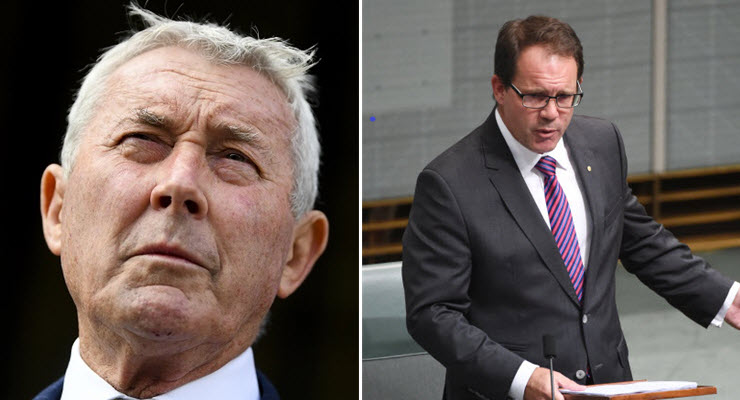
Labor MP Luke Gosling has called on Attorney-General Christian Porter to explain why his prosecution of Witness K and Bernard Collaery is in the public interest, and says the government has missed an opportunity to put its poor treatment of Timor-Leste in the past.
The Northern Territory MP has extensive links with the country after serving there while in the ADF and spending several years there running an NGO.
Earlier in the year, Gosling criticised Porter’s attempt to prosecute K and Collaery in a secret trial, but now says Porter must make up for his failure to explain why he is pursuing the two men.
“Porter is yet to provide a detailed explanation for his decision to prosecute Witness K and Collaery, to spell out why this action is in the public interest,” Gosling told Crikey. “If the government really cares about transparency and accountability, there’s a very easy place to start: just be upfront with Australians. They can handle it. So can our relationship with Timor Leste. The bonds between ordinary Australians and Timorese have never wavered.”
“In choosing to prosecute them, Porter decided in six months to do what his predecessor, George Brandis, chose not to do in his entire term. But the reasons for prosecuting these two Australians — the real reasons — are crucial details this government is being uncharacteristically silent about.”
Gosling viewed the settlement of the maritime border dispute between Australia and Timor-Leste in 2018 — after the Timorese initiated a case against Australia at the International Court of Justice — as a chance to reset relations. It’s an opportunity the government missed, he says.
“We had an opportunity to move on from the past after settling the maritime issue. It was a difficult period — we could have put it to bed. But the cover-up of previous incidents continues.”
Gosling has worked in Timor-Leste at the highest and most grassroots levels. After military service there, he produced the film A Debt of Honour detailing the experience of Australian soldiers in the INTERFET Timor-Leste mission and that of Australian commandoes operating under Japanese occupation there during WWII. During that time he met Collaery and popular leader Xanana Gusmao before returning as an ADF defence advisor to the new country’s military in 2005.
In between, he built schools, provided water to remote villages and helped deliver maternal health services — though, he says, he doesn’t want to overstate his work. He continues to try to help the country via seasonal worker programs, defence cooperation and his links with the Darwin Timorese diaspora. The K/Collaery case, he says, “has stirred up a lot of hurt for many Timorese and Australians alike”.
On the case itself, Gosling chooses his words carefully, declining to comment on the bugging or the circumstances in which Witness K revealed it. But the secrecy of the trial appals him.
“I understand the need for national security and the secrecy it involves, but it should be a last resort,” he said. “To what extent is this national security, and to what extent reputational protection by Porter?”
He points out the Law Council has reminded the government that open justice is a basic rule of Australian society and that secrecy “stacks the deck” against the defendants.
“When a law is unjust, free citizens have a right — in fact, a duty — to dissent, to protest, to organise, and to express their will at the ballot box. And if any of them are accused of breaking the law, they have the right to an open trial, which also exists to protect our legal system from becoming simply a politicised kangaroo court.
“The Washington Post’s motto is true on both sides of the Pacific,” Gosling warnings. “’Democracy dies in darkness’. We need to start rebuilding the ethical infrastructure of our nation.”
Let us know your thoughts by writing to letters@crikey.com.au. Please include your full name to be considered for publication in Crikey’s Your Say section.








Finally, a major party politician prepared to stand up and demand to have some light shed on this appalling prosecution. We can only hope it’s not too little too late. The levels of intimidation and secrecy used by the Morrison Government in disposing of whistleblowers would make Russia proud.
Good on you Luke, and please keep up the pressure….these deep injustices, including to Assange, need to stop immediately.
Labor needs to guarantee strong whistleblower protections, a powerful national broadcaster, and unhindered investigative journalism.
On 2 levels I thank you Crikey . I have been outraged that so little has been expressed about the Bernard Collaery disgrace and until this article I was unaware at the depth of interest and knowledge of Luke Gosling . What an admirable MP … bit late Labor but hope something comes of his intervention. As for Porter there are no words .
““If the government really cares about transparency and accountability, there’s a very easy place to start:”
Ha! Ha! Sorry, had to laugh at that one! This government doesn’t give a rat’s-arse about accountability OR transparency. These crooks just want to build up their vested interests & retire doing a well-paid board job. This Federal government is a disgrace!!
The Attorney General’s pursuit of these two good men with a secret trial is not my Australia. The whole affair is a shameful coverup of Liberal Party connections to Woodside.